Swarthmore Says…
Out of the mouths—and pens—of Swarthmoreans come some well-known words.
One of Swarthmore College’s many distinctions is the strong tradition of social and political activism, which can be attributed to the school’s Quaker origins. Swarthmore’s activist tendency has produced alumni who have been notable reformers. It has also combined with the College’s intellectual rigorousness to produce pioneers in the social sciences.
Another notable aspect of Swarthmore alumni is the extent of their contribution to the physical and biological sciences and technology, including computer science.
These activist and scientific threads complement Swarthmore’s strength in the arts and media as well as a wide range of achievements in education, law, business, and many other fields, to round out a fascinating roster of accomplishments by alumni.
The work of Swarthmoreans can be surveyed in a number of ways, such as awards won or offices held, but I am in a position to assess it in a novel fashion—through the lens of famous quotations. Alumni have written or uttered a number of memorable quotations or phrases; we speak a different language because of their sayings.
My personal position in quotation-gathering stems from having compiled The Yale Book of Quotations (Yale University Press, 2006). In that volume, I attempted to collect famous quotations and to use state-of-the-art research to trace their origins more accurately than do other reference works. The following quotations by Swarthmore graduates were included in the YBQ or were added by me using similar research techniques to those underlying the book.
Quotations from the arts are often whimsical. These two are from one of the most popular novelists of the last century and one of our zaniest musicologists.
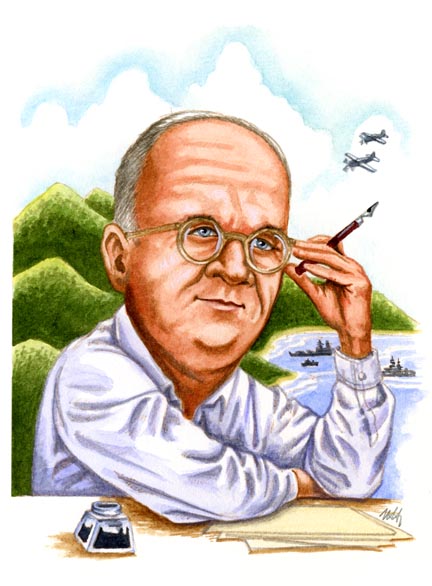
"I was brought up in the great tradition of the late 19th century: that a writer never complains, never explains, and never disdains." — JAMES MICHENER ’29, quoted in The New York Times, Nov. 14, 1989
"The last but least of J. S. Bach’s 20-odd children and by far the oddest of the lot."
PETER SCHICKELE ’57, quoted in the Los Angeles Times, June 5, 1966, describing his musical alter ego PDQ Bach:
The Equal Rights Amendment was drafted by Alice Paul, Class of 1905, and introduced in every Congress from 1923 to 1972, when it finally passed both houses by overwhelming margins. But the amendment fell three states short of the required 38 state ratifications and has yet to be added to the Constitution.
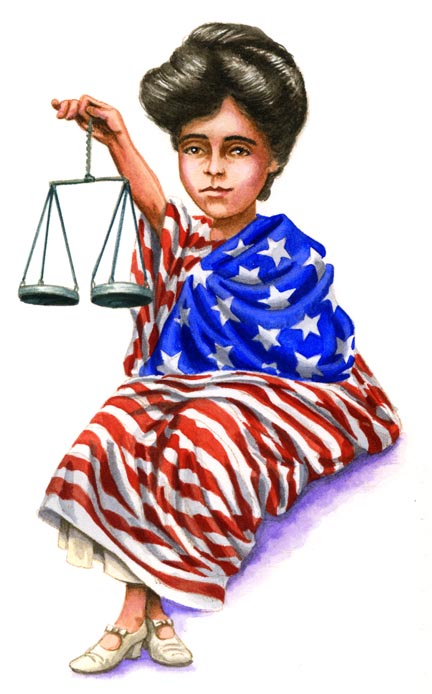
"Equality of rights under the law shall not be denied or abridged by the United States or by any State on account of sex." — ALICE PAUL, Class of 1905, Proposed Equal Rights Amendment, 1923
One of the most powerful political columnists of all time coined a celebrated phrase characterizing the United States Supreme Court at a time when the Court was viewed by many as a reactionary obstacle standing in the way of Franklin D. Roosevelt’s New Deal.
"The Nine Old Men."
—From DREW PEARSON'S [’19] book The Nine Old Men, published in 1937.
In electoral politics, one Swarthmore alumnus received the Democratic nomination for president but lost to George H. W. Bush in 1988.
"This election isn’t about ideology; it’s about competence."
—MICHAEL DUKAKIS ’55, accepting the presidential nomination, Democratic National Convention, 1988:
Activism spills over into social-science scholarship. Among the most prominent social scientists in recent decades is psychologist Carol Gilligan ’58, who studied the moral development of girls and founded “difference feminism,” including drawing a distinction between the “ethic of justice” and the “ethic of care.”
"While an ethic of justice proceeds from the premise of equality—that everyone should be treated the same—an ethic of care rests on the premise of nonviolence—that no one should be hurt."
—CAROL GILLIGAN ’58, In a Different Voice: Psychological Theory and Women’s Development, 1982
Swarthmore’s scientific/technological graduates include not only Nobel prize winners but also some remarkable computer visionaries. Here again, the impact has been linguistic and conceptual as well as substantive. The first quotation popularized the word “automation.”
"Automation is a new word denoting both automatic operation and the process of making things automatic."
—JOHN DIEBOLD ’49, Automation: The Advent of the Automatic Factory, 1952
The second quotation constitutes the coinage of the term “hypertext.” Ted Nelson’s hypertext and his efforts to create an easy-to-use computer interface helped pave the way for personal computers and the World Wide Web.
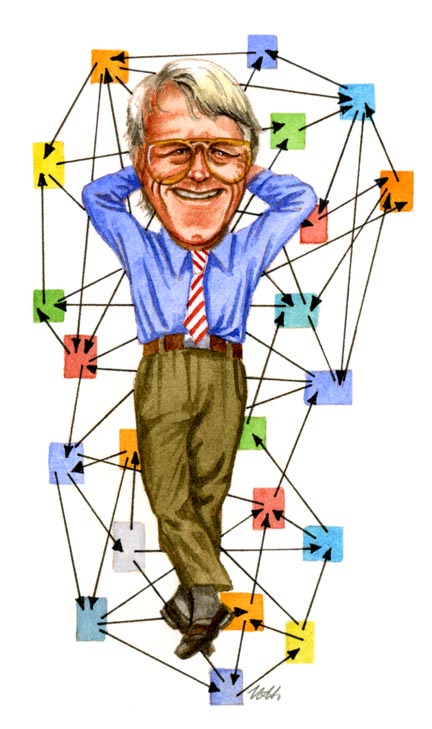
"Let me introduce the word 'hypertext' to mean a body of written or pictorial material interconnected in such a complex way that it could not conveniently be presented or represented on paper." — THEODOR NELSON ’59, Proceedings of the 20th National Conference of the Association of Computing Machinery, 1965
Swarthmore literary quotations include passages from some of the most acclaimed recent works of fiction—both winners of the National Book Award.
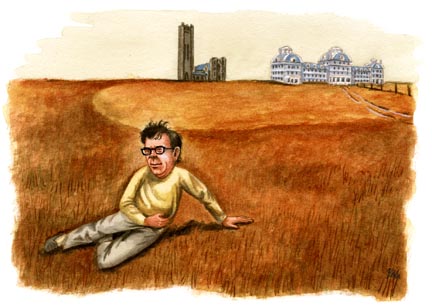
"The madness of an autumn prairie cold front coming through. You could feel it: something terrible was going to happen. The sun low in the sky, a minor light, a cooling star. Gust after gust of disorder. Trees restless, temperatures falling, the whole northern religion of things coming to an end."—JONATHAN FRANZEN ’81, author of The Corrections, 2001
"In Africa, you want more, I think." — NORMAN RUSH ’56, Mating: A Novel, 1992
We conclude this romp through Swarthmore quotation history with two quotes representing two of the many other fields in which alumni have distinguished themselves—sports and education.

I find that the three major administrative problems on campus are sex for the students, athletics for the alumni, and parking for the faculty." — CLARK KERR ’32, quoted in Time, Nov. 17, 1958
"Sports do not build character. They reveal it." — HEYWOOD HALE BROUN ’40, quoted in James Michener, Sports in America, 1976
If you know of other famous—or infamous—Swarthmore quotations, write to us at bulletin@swarthmore.edu or Swarthmore College Bulletin, 500 College Avenue, Swarthmore PA 19081. We’ll add them to the Web site for this article.
Fred Shapiro is associate librarian for collections and access and lecturer in legal research at Yale Law School. He is the editor of the Yale Book of Quotations (Yale University Press), which was named a Best Book of 2006 by amazon.com—one of many honors—and was favorably reviewed by The New Yorker, The New York Times, The Times (London), the Wall Street Journal, and National Public Radio.
Illustrator Nancy Harrison spent most of her life in Montreal but now lives in Vermont. With a B.F.A., she worked as a graphic artist, illustrator, and art director/vice president of an ad agency. Later obtaining an M.A. in illustration from Syracuse, Harrison became self-employed in 1990. She has worked on more than 30 children’s books, contributed to the Bulletin many times, and says she is “havin’ more fun than should be legal.”
 Email This Page
Email This Page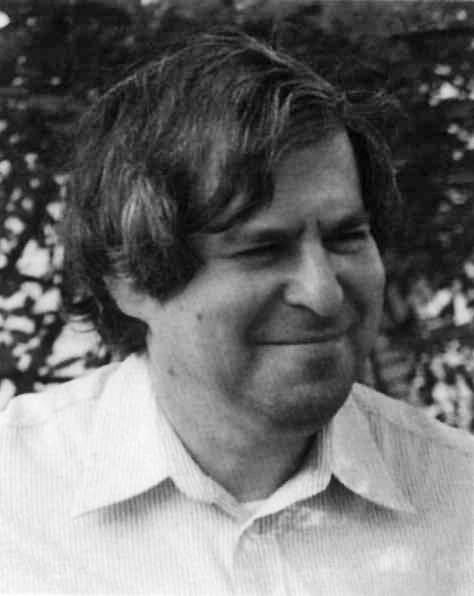
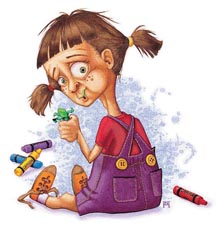

November 21st, 2008 3:18 am
This bulletin is a superior issue.
August 29th, 2010 8:14 am
Whats up everybody I'm Richard but mostly referred to as Sirricharic, I'm 16 and a good friend of Americo24 who directed me to this site. I've been working with computers for 10 years (since 1st grade) self taught and I am beginning on video editing and Audio Visible stuff. I'll most likely be the guy with the crappiest laptop within the forum till like forever Tacky I hope i will have the pleasure in exchanging information with you guys.